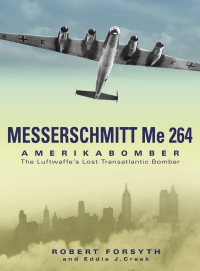|
S u m m a r y
|
| ISBN: |
1-903223-65-2 |
| Media: |
Hardback with colour dust
jacket; 303mm x 226mm in portrait format; 128 pages; approx. 170
photographs; line drawings; tables |
| Price: |
£19.99 plus shipping, online from Ian
Allan Publishing
|
| Review Type: |
First Read |
| Advantages: |
The definitive work to
date on the Messerschmitt Me 264; excellent coverage of the
Amerika Bomber concept,
development, testing and its competitors; readable and interesting
text; packed with factory drawings and translated excerpts from
official documents; high quality artwork; attractive layout. |
| Disadvantages: |
|
| Recommendation: |
Highly Recommended |
Reviewed by Brett Green

"Messerschmitt Me 264 - Amerika Bomber" is available online
from Squadron.com
 Classic
Publications has established an enviable reputation as the creator of
authoritative reference books on Luftwaffe subjects, including some of
the more obscure, esoteric yet intriguing projects that failed to reach
operational status Classic
Publications has established an enviable reputation as the creator of
authoritative reference books on Luftwaffe subjects, including some of
the more obscure, esoteric yet intriguing projects that failed to reach
operational status
The ambitious concept behind the Messerschmitt Me 264 was to build an
aircraft capable of reaching any point of the globe without refuelling.
As the war progressed, harsh practicalities threw barriers in the path
of this scheme. The bleak truth of the situation, however, did not
prevent optimism for the concept in Germany, and anxiety about the
existence of an Amerika Bomber throughout US and British
intelligence communities. There was even the fear that this formidable
machine might be used to drop atomic weapons on the USA at will.
The reality was that Germany could not afford to build a fleet of
these long-range bombers and, in any case, that the Luftwaffe's
experience with their heaviest operational bomber, the Heinkel He 177,
was fraught with mechanical and technical failures, and limited
operational advantages over medium bombers or large maritime aircraft
adapted to specialist roles.
Despite the frustrations of the single prototype, the story of the Me
264 remains a fascinating one. Robert Forsyth covers initial heavy
bomber designs - the Dornier Do 19 and Junkers Ju 89, the Amerika
Bomber concept, the Me 264 design, prototype construction (with many
excellent factory photos of the Me 264 V1 being assembled),
specifications, powerplants, flight testing, and its contemporary
Luftwaffe behemoths, the Bv 222 flying boat and the Heinkel He 277.
The layout of the book is punctuated with around 200 photos, factory
drawings, translated extracts from official documents and tables,
ensuring that the reading is never laborious. Two pages of attractive colour artworks by Gino Marcomini
illustrate some of the advanced concepts for the Me 264 that never left
the drawing board - a long-range bomber with four piston engines and two
turbo jets; and a long-range reconnaissance aircraft with four in-line
pusher propellers and two turbo jets.
The author's text is logically laid out, comprehensive and
informative, while remaining admirably readable.
Little has been published to date on the Messerschmitt Me 264. Robert
Forsyth's work is undoubtedly now the definitive work on the subject, and
will be fascinating to Luftwaffe aficionados and aerospace enthusiasts
alike.
Highly Recommended.
Thanks to Simon from DLS and Ian
Allan Publishing for the review sample
Review Copyright © 2006 by
Brett Green
This Page Created on 16 October, 2006
Last updated 16 October, 2006
Back to HyperScale Main Page
Back to Reviews Page
|
Home | What's
New | Features
| Gallery |
Reviews | Reference
| Forum
| Search